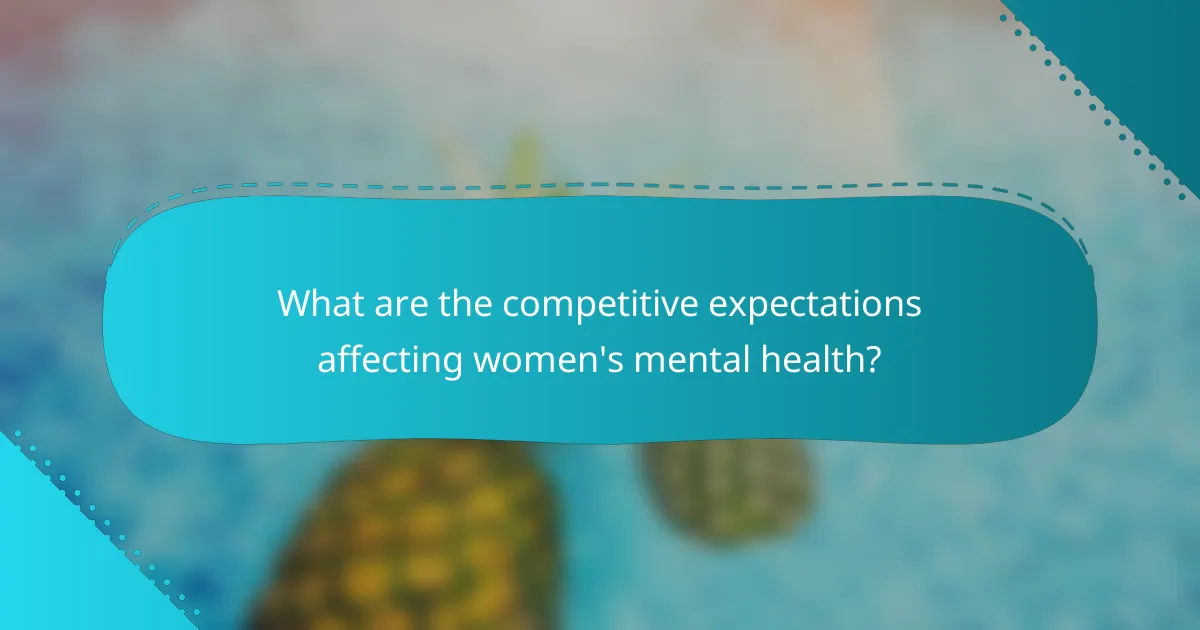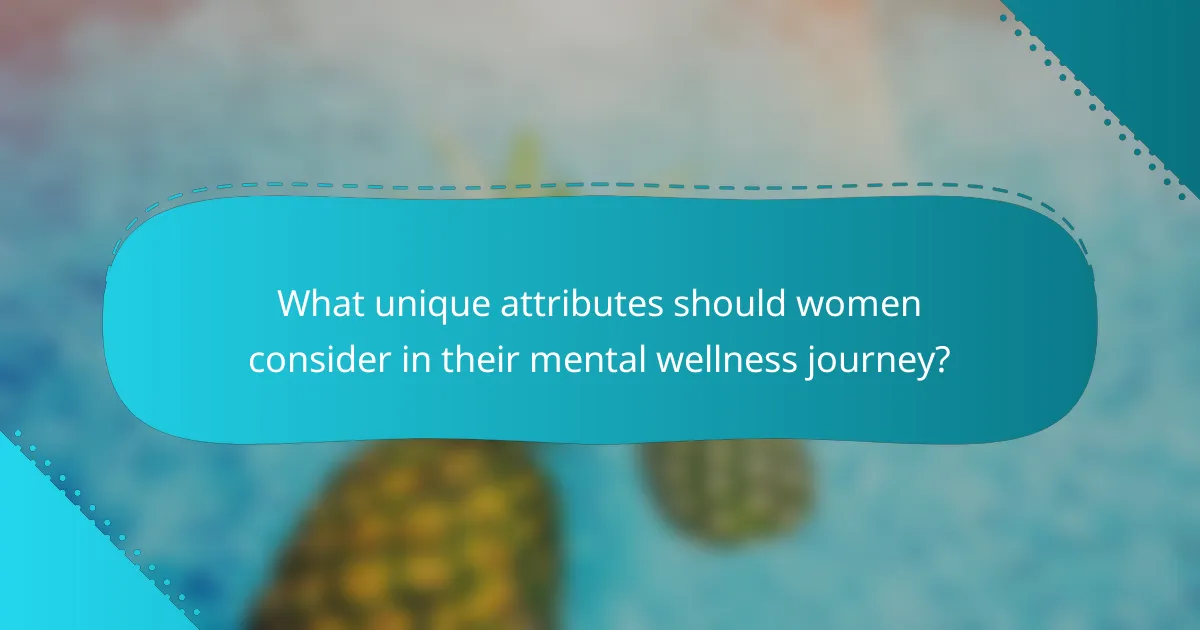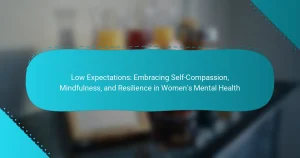Navigating competitive expectations is crucial for women’s mental health, as stress and anxiety often arise from societal pressures. This article explores the impact of these expectations, highlights effective self-care practices, and emphasizes the importance of empowerment through community support. Understanding unique challenges and fostering resilience can significantly enhance mental well-being for women.

What are the competitive expectations affecting women’s mental health?
Competitive expectations significantly impact women’s mental health by creating stress and anxiety. Societal pressures to excel in various roles contribute to feelings of inadequacy. Women often face unique challenges, such as balancing career ambitions with family responsibilities.
Research indicates that 70% of women report stress related to competitive environments. This stress can lead to mental health issues like depression and anxiety disorders. Self-care practices, such as mindfulness and physical activity, are essential for mitigating these effects. Empowerment through supportive networks also plays a crucial role in enhancing resilience against competitive pressures.
Addressing these expectations requires a shift in societal norms to promote mental well-being and balance. Encouraging open discussions about mental health can empower women to seek help and support.
How do societal pressures contribute to stress in women?
Societal pressures significantly contribute to stress in women by fostering unrealistic competitive expectations. These pressures often stem from cultural norms that emphasize achievement in various domains, such as career, family, and appearance. As a result, women may experience heightened anxiety and self-doubt, impacting their mental health. Research indicates that 70% of women report feeling overwhelmed by societal demands, leading to stress-related health issues. Empowerment through self-care practices can mitigate these effects, promoting resilience and well-being.
What role does self-care play in managing competitive expectations?
Self-care is essential for managing competitive expectations as it fosters resilience and emotional balance. Engaging in self-care activities helps women mitigate stress, leading to improved mental health outcomes. Research indicates that regular self-care practices can enhance self-esteem and empower individuals to navigate competitive environments effectively. Prioritising self-care allows women to maintain focus and clarity, reducing the pressure associated with competition.
What are effective self-care practices for women facing stress?
Effective self-care practices for women facing stress include mindfulness, physical activity, and social support. Mindfulness techniques, such as meditation or deep breathing, can enhance emotional regulation. Regular physical activity, like walking or yoga, reduces stress hormones and boosts mood. Building a strong social support network fosters connection and resilience. Prioritising sleep hygiene is essential for mental clarity and emotional balance. Exploring creative outlets, such as art or writing, can provide therapeutic expression. Lastly, setting boundaries and saying no can empower women to manage their commitments and reduce overwhelm.
How can women prioritise self-care amidst busy schedules?
Women can prioritise self-care by scheduling dedicated time for relaxation and setting boundaries. Incorporating small, manageable practices into daily routines can alleviate stress. For example, mindfulness exercises or short breaks can enhance mental well-being. Research indicates that consistent self-care can improve resilience against competitive expectations. Additionally, connecting with supportive networks fosters empowerment and reduces feelings of isolation. Prioritising self-care is essential for sustaining mental health amidst busy schedules.
What unique challenges do women face in achieving empowerment?
Women face unique challenges in achieving empowerment due to societal pressures, mental health stigma, and balancing roles. Competitive expectations can lead to increased stress, impacting self-care and overall well-being. Research indicates that women often experience higher levels of anxiety and depression, which can hinder empowerment efforts. Additionally, the pressure to conform to idealised standards can create conflicts between personal aspirations and societal demands. Addressing these challenges requires a focus on mental health support and fostering environments that prioritise self-care and resilience.
How does empowerment influence mental wellness in women?
Empowerment significantly enhances mental wellness in women by fostering resilience, self-efficacy, and a sense of control. Women who feel empowered are more likely to manage stress effectively and prioritise self-care. Research shows that empowerment leads to improved mental health outcomes, such as reduced anxiety and depression. Additionally, empowered women often engage in supportive communities, which further promotes emotional well-being.

What universal attributes of mental health apply to women?
Women face unique mental health challenges influenced by competitive expectations, societal pressures, and self-care practices. These universal attributes include stress management, emotional resilience, and the importance of community support. Research indicates that women often experience higher levels of anxiety and depression due to these competitive pressures, necessitating effective self-care strategies. Empowerment through education and awareness can enhance mental well-being, promoting healthier coping mechanisms.
How does resilience impact women’s mental health?
Resilience positively impacts women’s mental health by enhancing coping mechanisms and reducing stress. Women with higher resilience often experience lower rates of anxiety and depression. Studies show that resilient women engage in effective self-care practices, which further empower them to navigate competitive expectations. Resilience fosters a supportive environment, enabling women to build strong social networks that contribute to improved mental well-being.
What are the common signs of stress in women?
Common signs of stress in women include anxiety, irritability, fatigue, and changes in sleep patterns. Women may also experience physical symptoms like headaches, muscle tension, and digestive issues. Social withdrawal and emotional outbursts are frequent indicators, reflecting the impact of competitive expectations on mental health. Recognising these signs is crucial for effective self-care and empowerment strategies.

What unique attributes should women consider in their mental wellness journey?
Women should consider unique attributes like self-acceptance, community support, and resilience in their mental wellness journey. Self-acceptance fosters a positive self-image, reducing stress from societal expectations. Community support provides a network for sharing experiences, enhancing emotional well-being. Resilience enables women to navigate challenges effectively, promoting empowerment. These attributes contribute to a holistic approach to mental health, addressing both internal and external pressures.
How can personal values shape mental health strategies?
Personal values significantly influence mental health strategies by guiding decision-making and prioritising self-care. For instance, women who value empowerment may adopt proactive stress management techniques, enhancing resilience. Research indicates that aligning mental health practices with personal values can lead to improved emotional well-being and reduced anxiety. By recognising individual values, women can create tailored strategies that foster a supportive environment, ultimately promoting better mental health outcomes.
What unique resources are available for women in mental health support?
Women have access to unique resources for mental health support that address their specific needs. These include community-based programmes, online platforms, and specialised therapy groups. Organisations like the Women’s Mental Health Network provide tailored resources, focusing on stress management and self-care strategies. Additionally, peer support groups foster empowerment through shared experiences, enhancing resilience. Access to these resources can significantly improve mental well-being, offering women a supportive environment to navigate challenges.

What rare attributes should women be aware of regarding mental health?
Women should be aware of unique attributes like societal pressures, perfectionism, and comparison culture that impact mental health. These factors can lead to heightened stress and anxiety. A study found that 70% of women experience increased pressure to meet unrealistic expectations, affecting their self-esteem. Understanding these rare attributes helps in developing effective self-care strategies. Empowerment through community support and open conversations can mitigate these challenges.
How do cultural factors influence women’s mental health perceptions?
Cultural factors significantly shape women’s mental health perceptions by influencing stress levels, self-care practices, and empowerment. Societal expectations often create competitive environments that heighten stress, impacting mental well-being. For instance, women may feel pressured to excel in various roles, leading to burnout. This competitive expectation can hinder self-care, as women prioritise external validation over personal health. Empowerment initiatives that promote mental health awareness can counteract these pressures, fostering resilience. Recognising these cultural influences is essential for developing effective mental health strategies tailored to women’s unique experiences.
What are some uncommon but effective coping strategies?
Some uncommon but effective coping strategies include engaging in creative expression, practising mindfulness meditation, utilising nature therapy, and adopting a pet. Creative expression allows for emotional release and self-discovery. Mindfulness meditation enhances awareness and reduces anxiety. Nature therapy promotes relaxation and connection to the environment. Adopting a pet provides companionship and encourages routine, which can alleviate stress. These strategies empower women to navigate competitive expectations and prioritise mental health.

How can women effectively navigate competitive expectations?
Women can navigate competitive expectations by prioritising self-care, setting boundaries, and fostering empowerment. Acknowledging stress triggers is crucial; mindfulness practices can enhance mental resilience. Establishing supportive networks provides encouragement and shared experiences. Embracing individual strengths fosters confidence, enabling women to thrive in competitive environments.
What practical steps can women take to manage stress?
Women can manage stress through practical steps that prioritise self-care and empowerment. First, establish a daily routine that includes time for relaxation and activities that bring joy. Second, engage in regular physical exercise, as it significantly reduces stress levels. Third, practise mindfulness techniques such as meditation or deep breathing exercises to enhance emotional resilience. Fourth, maintain a supportive social network by connecting with friends and family, which can provide encouragement and reduce feelings of isolation. Finally, set realistic goals and learn to say no to excessive demands, helping to create a balanced lifestyle.
What are the common mistakes women make in self-care?
Women often make several common mistakes in self-care that hinder their mental health. These include neglecting personal needs due to competitive expectations, prioritising others over themselves, and feeling guilty about taking time for self-care. Many women also underestimate the importance of setting boundaries, leading to increased stress. Additionally, they may overlook the necessity of seeking support from others, believing they must handle everything independently. Recognising these pitfalls can empower women to adopt healthier self-care practices.
What expert insights can enhance women’s mental wellness?
Expert insights for enhancing women’s mental wellness focus on managing competitive expectations, promoting self-care, and fostering empowerment. Strategies include setting realistic goals, prioritising mental health, and engaging in supportive communities. Research indicates that women often face unique stressors that can impact their well-being. For instance, studies show that women are more likely to experience anxiety related to societal pressures (Source: Journal of Mental Health). Prioritising self-care activities, such as mindfulness and physical exercise, can significantly improve mental health outcomes. Empowerment through education and access to resources also plays a crucial role in enhancing resilience and coping strategies.
How can women build a supportive community for mental health?
Women can build a supportive community for mental health by fostering open communication, sharing resources, and creating safe spaces. Establishing regular meet-ups encourages connection and trust among members. Empowerment through shared experiences reduces feelings of isolation. Research shows that social support significantly enhances mental well-being, leading to improved resilience against stress. Additionally, utilising online platforms can extend reach, allowing women to connect beyond geographical limitations. Prioritising mental health discussions in these communities normalises the conversation, making it easier for women to seek help and support.
What are the key takeaways for improving mental health and wellness?
To improve mental health and wellness, focus on self-care, managing stress, and fostering empowerment. Prioritise activities that enhance emotional resilience, such as mindfulness practices and physical exercise. Establish supportive social connections to combat feelings of isolation. Set realistic expectations to reduce pressure and promote a balanced lifestyle. Regularly assess mental health needs and seek professional support when necessary.




